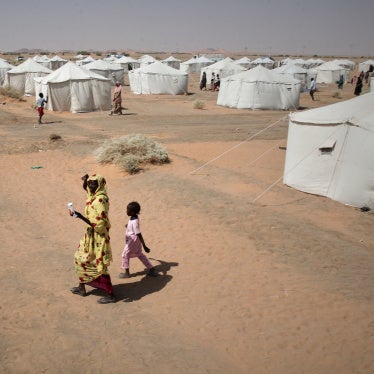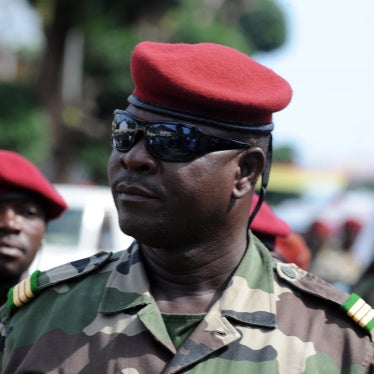Recent weeks have shown how the political elite keep blocking the path to reconciliation in Côte d’Ivoire. The leadership from both sides of the politico-ethnic divide appears unwilling to learn the vital lessons from a decade of civil conflict in which thousands of civilians were killed. It comes down to this: Rather than accept responsibility for their role in the country’s descent into violence, those from each side cling to the belief that they – and only they – are merely victims.
The latest round of political name-calling began on July 8, when President Alassane Ouattara visited northern Côte d’Ivoire. He started with a benign exhortation to the Ivorian Popular Front (FPI), the political party of former President Laurent Gbagbo, to “enter the peace process.” Gbagbo’s refusal to accept internationally-recognized election results in 2010 helped spark six months of violence. He now sits in detention in The Hague, awaiting a decision by International Criminal Court judges on whether to confirm charges of crimes against humanity.
President Ouattara, in his speech, called on the FPI’s “leaders to ask for forgiveness from the victims and the victims’ families…. I ask that they take this strong gesture, repentance for forgiveness. Ivorians need them to.” It was a reasonable request. The FPI has refused to accept any responsibility for the post-election violence, demanding ceaselessly that its supporters be released from prison – no matter how great the evidence of their involvement in serious crimes.
Yet President Ouattara’s statement also reflects a degree of hypocrisy from the government. Government officials often speak – including during recent weeks – as if pro-Gbagbo forces were responsible for the deaths of all of the more than 3,000 people killed during the crisis. But the government should read the August 2012 report of its own national commission of inquiry, which documented 1,452 killings by pro-Gbagbo forces and 727 killings by the Ouattara side’s Republican Forces. The government should be asking for forgiveness from many victims and victims’ families as well.
The government’s short-sightedness is also reflected in its justice efforts. On July 10, Ivorian judges confirmed charges against 84 people – all on the Gbagbo side – for crimes linked to the post-election period, setting the stage for trials. In a June 26 report, the United Nations secretary-general said that “only perpetrators affiliated with the former regime have so far been brought to justice” and that “of the 207 investigations opened since [the national commission of inquiry report], 204 relate to perpetrators affiliated with former President Laurent Gbagbo.” While Ivorian authorities are right to prosecute those on the Gbagbo side responsible for grave crimes, the one-sided nature of investigations and prosecutions raises fears that justice is primarily a tool the victors are wielding to punish opponents.
On July 15, the FPI responded to President Ouattara’s call in a depressingly predictable manner, refusing to “repent” and saying that the “true criminals” were in the government. The FPI expressed outrage over the decision to try the 84 defendants, demonstrating that its denunciations of “victor’s justice” hardly reflect an interest in impartial justice. Instead, it just wants everyone on the Gbagbo side freed – regardless of their criminal responsibility.
Both sides argue over the impossible question of which political party started the country’s crisis, rather than addressing the devastating crimes their forces committed. The Gbagbo side focuses on the 2002 rebellion that left the country divided for the remaining years of Gbagbo’s presidency. It claims that Ouattara “introduced violence [and] tribalism” into Ivorian politics.
Of course, this ignores the role of FPI leaders in human rights abuses following their electoral victory in 2000, when Ouattara was denied the right to take part in both presidential and legislative elections and security forces violently suppressed protests by his supporters. It ignores the Gbagbo government’s discrimination against northern Ivorians and immigrant populations, under the ultranationalist idea of Ivoirité. It ignores the close relationship that existed between the FPI and several violent pro-Gbagbo militia groups. It also ignores the hate speech by FPI leaders on television and in newspapers, which Human Rights Watch found was linked to spikes in violence against perceived Ouattara supporters during the post-election crisis.
For its part, the current government argues that if not for Gbagbo’s refusal to step down in 2010, the post-election violence would have been averted. But regardless of the post-election crisis’s origin or the crimes by Gbagbo’s forces, there was no legal or moral excuse for the pro-Ouattara forces’ many crimes against perceived Gbagbo supporters. The government also ignores the grave crimes committed during and after the 2002 rebellion. Many leaders fromthe Forces Nouvelles rebel group, which helped Ouattara take control of the country in 2011, now occupy key posts in the military and in the civilian government. Some of them are implicated in war crimes and likely crimes against humanity, yet remain above the law.
In President Ouattara’s speech, he said that asking for forgiveness builds respect and called for a “gesture of humility from the FPI in order to turn the page.” He couldn’t be more right; acknowledging their role in the country’s decade-long crisis would do much to elevate the FPI’s tattered credibility. But many Ivorians are waiting for the same gesture from the current government, too.
Reconciliation will move forward only when the political elite from both sides is willing to accept responsibility for the country’s wasted decade of conflict and violence and to support all victims in their demand for justice.
Matt Wells is the Côte d’Ivoire researcher at Human Rights Watch.








